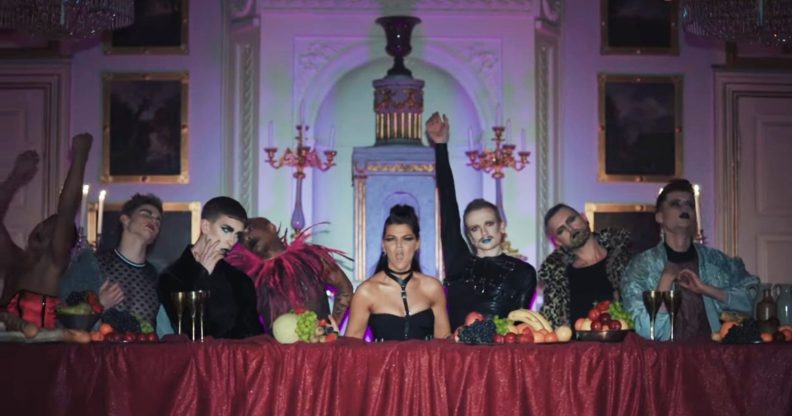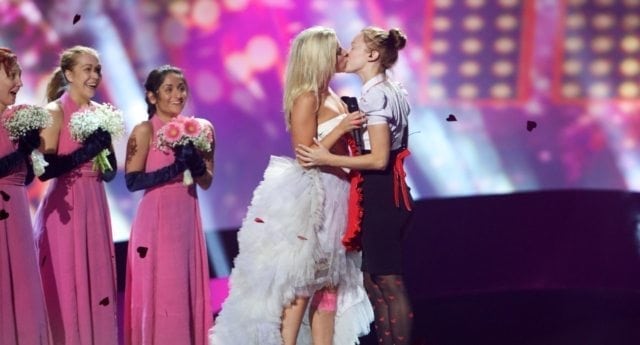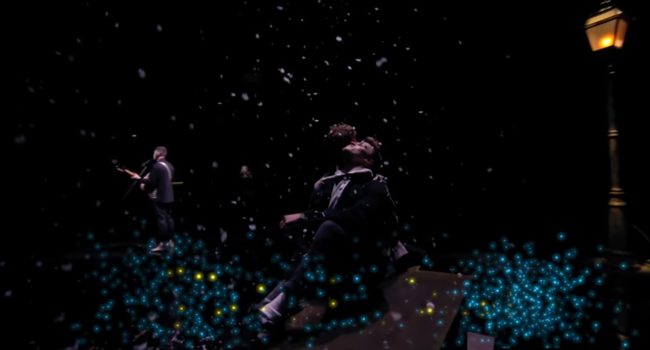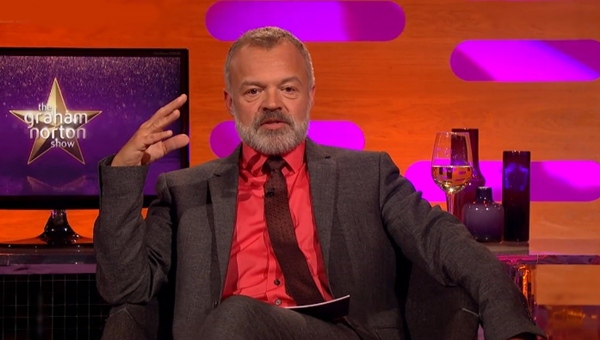Eurovision Song Contest 2018: The LGBTQ anthems to watch out for

All aboard! Here’s a rundown of people who are celebrating diversity at the Eurovision Song Contest 2018.
The Eurovision Song Contest kicks off on Tuesday night with the first semi-final.
The contest has become known as a celebration of diversity in recent years, and has featured everything from an on-stage same-sex wedding to a bearded drag icon.

2013 Finnish Eurovision entrant Krista Siegfrids gets mock-married to a woman onstage during her performance (Ragnar Singsaas/Getty)
But does Eurovision 2018 feature any celebration of the LGBT community? In short – yes!

The staging for Ireland’s entry “Together”
From queer icons to gay anthems, here are some of the entries to keep an eye on this week.
Ireland
Irish entrant Ryan O’Shaughnessy is set to perform the track “Together,” a moving ballad about a failed relationship.
Although the lyrics do not explicitly reference the gender of the lover, the artist surprised fans by dropping an enchanting music video for the track featuring two male dancers re-enacting a same-sex love story.
The well-received video was adopted in the live staging for the song, with O’Shaughnessy set to be accompanied by the dancers on stage at the contest itself.
The brief snippets released from rehearsals show the pair re-enacting the routine from the video, having an intimate moment on a bench.
Russia has threatened to block the broadcast of the performance over the routine.
Eurovision rules state that each country’s broadcaster must air all the entries in full, and cannot censor any of the performances.
O’Shaughnessy will perform 18th in the running order in the first semi-final on Tuesday (May 8), where he will hope to qualify for the Grand Final on Saturday (May 12).
Finland
Bonafide queer icon Saara Aalto is set to represent her home country with the up-tempo song “Monsters.”
The track’s official video is a glorious celebration of identity, featuring genderfluid performers and drag artists – and a very queer reenactment of The Last Supper.
However, the on-stage performance appears to have taken a different route, featuring dancers in militaristic uniforms gathered around a giant Illuminati-esque pyramid. Boo.
Aalto told PinkNews the song is about “living life as you want, finding your strength, being brave as who you are and not being afraid to show it.”
She added: “I am very proud to be lesbian and I feel very much like I am lesbian, totally.”
Saara Aalto will perform 15th in the first semi-final on Tuesday (May 8), hoping to land a ticket to the Grand Final.
Israel
Bwok bwok! Netta Barzilai is hot favourite to take the trophy with track “Toy,” which is like nothing heard on the Eurovision stage before – utilising chicken noises and an electronic looper.
The track’s all about female empowerment, including the line: “Wonder Woman, don’t you ever forget / You’re divine and he’s about to regret / He’s a bwoka-mhm-bwokbwokbwok-mhm boy.”
Netta has already picked up an OUTtv award after winning a vote among the contest’s LGBT fanbase.
She told LGBT fans: “You hold me up. My whole team – my hair, my makeup, my costume, the writers of the song – are members of the gay community and I am lost without them. I’m grateful for the presence of the gay community in my life.”
Of her song, she added: “I think the song is #MeToo, but it’s an empowerment song for everybody, and everybody can find themselves in it. For me, when I sing it, I think about bullying and people who try to bring you down because they’re afraid of you. It’s an empowerment song for everybody.”
Netta Barzilai will perform 7th in the first semi-final on Tuesday. Given the buzz around the track, a ticket to the final seems all but guaranteed.
Malta
Malta’s 2018 entry definitely touches on themes of diversity, as Christabelle represents the tiny island nation with “Taboo.”
Though not explicitly LGBT, the song is definitely about discrimination and identity, featuring the lyrics:
Let our guards down it’s time to break the taboo
Before we all become animals, animals
Echoes in my head, got to break the taboo
No we will never be criminals, criminals
Read into that what you will. The staging sees Christabelle flanked by images of protests.
Christabelle will perform 12th in the second semi-final on Thursday (May 10). Malta has failed to reach the final twice in the past three years, but she’ll still be hoping for a golden ticket.
San Marino
The microstate’s cash-strapped broadcaster had to run a crowdfunding campaign to raise the cash to enter Eurovision this year – but fans raised enough to send Jessika and Jenifer Brening to the contest.
The pair are set to perform “Who We Are,” a track about standing up to bigots and bullies which features the lyrics:
Bullied from the moment we were born
We were always on our own
No one ever said we should be proud
Or embrace the fact of standing out
Speaking to OutTV, Jessika said: “I’ve had people texting me that they were bullied for being gay, and [responding to] the song.
“Its a positive song, even though we’re talking about bullying, because I’ve been broken down, I’ve faced hate speech, but my friends and family supported me during those times. It’s a song that empowers people, and we want people to use it as an anthem. which is about standing up to bullies.”
Jessika and Jenifer Brening will perform 4th in the second semi-final. San Marino have only ever reached the final once… so catch the entry while you can on Thursday.
What time is the Eurovision Song Contest, and who is doing commentary?
The BBC has an all-LGBT commentary line-up this year.
The first semi-final airs on Tuesday at 8pm on BBC Four, with commentary from Rylan Clark and Scott Mills.
The second semi-final airs on Thursday at 8pm on BBC Four, again with commentary from Clark and Mills.
The grand final airs on Saturday at 8pm on BBC One with commentary from Graham Norton.

In the US, the May 12 final is airing live on LogoTV at 3pm EST, with commentary from Ross Mathews and Shangela from RuPaul’s Drag Race.
A global stream of all three events without commentary is available via the official Eurovision YouTube channel.

